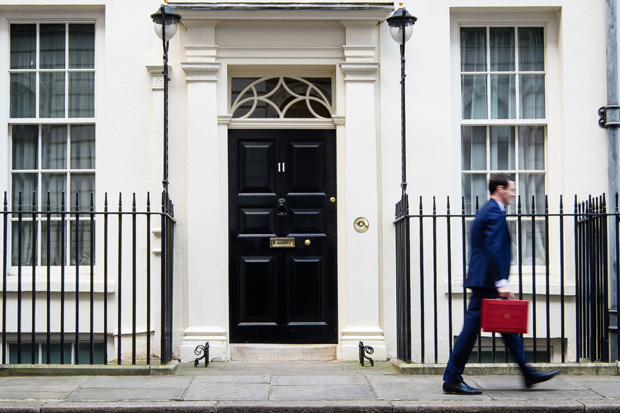Give thanks for George Osborne — and I don’t say that because I happen to be writing this column on a slow train from Leeds to Manchester, a line that this Chancellor has just promised, for the umpteenth time, to upgrade. I say it because whatever flaws and gimmicks may have leapt out of Wednesday’s budget, however the actualities have drifted away from the forecasts, at least we have a finance minister who is on the front foot.
Boost growth; balance the books; keep the state lean; devolve to the regions; nurture self-reliance and entrepreneurship; stay in Europe; succeed Cameron; win the next election. That’s the agenda. You may not buy all of it. But respect the drive behind it — and compare it to what’s happening in the eurozone, where the absent role of a finance minister with a fiscal strategy has been delegated to central bank governor Mario Draghi, who has launched an anti-deflation programme of deep negative interest rates, more quantitative easing and liquidity support for banks that smacks of utter desperation; markets barely knew whether to laugh or cry when they heard the news last week. The irony of the pro-‘remain’ Osborne’s attacking style is that, by showing what Europe lacks, he bolsters the case for leaving.
Blunt as a butcher
I was in a minority of reviewers who preferred Michael Lewis’s second book on the financial crisis, Boomerang, to his first, The Big Short — which I found tiresome, relying as it did on a cast of horrid hedge-fund geeks who had to be reinvented as engaging characters for Adam McKay’s film. But I enjoyed the epilogue in which Lewis lunched with his former boss at Salomon Brothers, John Gutfreund — who was memorably caricatured as a trading-floor egomaniac in Lewis’s 1989 bestseller Liar’s Poker, and who died last week. He found the older Gutfreund still ‘blunt as a butcher’, but self-aware and rueful; for all the vulgarities of his Wall Street ilk, they were never as dehumanised by greed as their successors — the likes of Dick Fuld of Lehman and Jimmy Cayne of Bear Stearns.
Gutfreund’s later career was blighted by a bond-trading scandal in 1991, but his real legacy was the deal he struck ten yearsearlier to sell Salomon to the commodity trader Phibro and turn the group into a public company, of which he was chairman. In doing so he enriched himself but destroyed the collegiate culture on which Salomon had been built and (as Lewis put it) ‘helped create a monster’: setting a path for the transformation on both sides of the Atlantic of many other tightly run partnerships — in which traders staked their own capital, and tempered risk-taking accordingly — into shareholder-owned firms where those same traders were dangerously free togamble with other people’s money.
Well-earned
Here’s another exception to my general belief that FTSE100 chiefs aregrotesquely overpaid. Last week I said Bob Dudley deserved ‘plenty’ for enduring a tough job at BP; this week I salute Sir Martin Sorrell of the advertising giant WPP. This veteran dealmaker is due to receive £60 million in cash and shares for last year under a long-term scheme which gave him £43 million for 2014. Some shareholders are angry — but they should remember that Sorrell created WPP in 1986 and built it first into a transatlantic leader of its industry, and latterly a global one, whose shares have doubled over the past five years while the FTSE has fallen back where it started. Sorrell deserves to be rewarded as a feisty entrepreneur, rather than bracketed with your standard hired-in corporate mercenary.
Whether £100 million over two years is a fair measure of his success is a trickier question, though American peers in the ad biz wouldn’t quibble at such largesse. More pertinently, as a 71-year-old workaholic who has already banked a nine-digit fortune, what on earth can he do with the extra loot? I gather he enjoys fishing in Iceland: that sort of money could buy an entire trawler fleet.
Monstered
One reason why Sorrell reigns unthreaten-ed — despite setting records for the gap between his own pay and that of his average employee — is that he’s a maestro of behind-the-scenes media handling. The same can’t be said of Mike Ashley, the Sports Direct founder and Newcastle United owner who is reputedly the UK’s 22nd richest citizen. Despite this column’s praise for his ‘remarkable self-made success story’, and my tips for a makeover (I suggested a trip to Savile Row and a weekend’s shooting with the Duke of Westminster), Ashley’s public profile goes from bad to worse.
His appointment of Rafa Benitez to manage Newcastle has failed to make fans hate him less, especially since Rafa’s first game was a 1-0 defeat by Leicester’s giant-killers. And he’s fighting to avoid appearing before the Commons Select Committee for Business, Innovation and Skills to answer questions about allegedly harsh treatment of the workforce of Sports Direct’s headquarters at Shirebrook in Derbyshire. Ashley’s response that he would look for himself into what’s going on at Shirebrook (said by reporters from the Guardian to include searches of staff to make sure they are not wearing clothing brands, even underpants, stocked by the company) has cut no ice with the committee chairman, Labour MP Iain Wright; nor has Ashley’s breezy suggestion that MPs are welcome to drop in some time.
The alliance of those who would like to see this supposed monster of capitalism humbled by a select committee show-trial also includes the Unite union. My advice to Ashley this time round is that he should go on refusing the summons (it’s not clear that they really have the power to compel him) but meanwhile make a clean breast of his employment practices, put the football club up for sale, grow a beard and take a long holiday in the South Pacific.







Comments